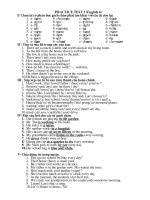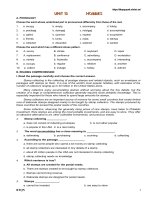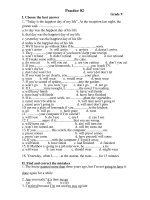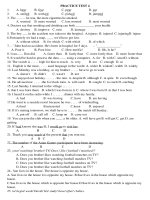- Trang chủ >>
- Luật >>
- Luật thương mại
Grade 10 Unit Five Practice Test 2
Bạn đang xem bản rút gọn của tài liệu. Xem và tải ngay bản đầy đủ của tài liệu tại đây (113.24 KB, 3 trang )
<span class='text_page_counter'>(1)</span>UNIT FIVE – TEST 2 (September 29th, 2016) I. Complete the dialogue with the correct form of the verbs in the list. come - go - meet - need - not know - not want - understand - worry Jessica: Eve, (1) are you going to Wendy's party on Saturday? Eve: I think so. What about you? Jessica: Yes, but I (2)......what to wear. Eve: Jessica, it's only Monday! Why (3)......you about the party already? Jessica: Well, Jamie (4)......, so I (5)......to look a mess. Eve: Now I (6)...... ! In that case, you (7)......to buy something special to wear. Jessica: I know! I'm (8)......Jane at the shopping centre after school today! Eve: You're so organised, Jessica! II. Read the text and choose the correct answers. Today, many teenagers (1)......a hoody instead of a coat to keep warm when they're outside. However, some adults (2)......hoodies. They (3)......that young people who (4)......these sweatshirts are criminals, and that the teenagers (5)......the hood to hide their identity when they (6)......things they shouldn't be doing. For example, shoplifters often wear hoodies because they (7)......their faces to appear on security cameras when they (8)......things from shops. Nowadays, some shopping centres (9)......to introduce a ban on hoodies to stop this problem. 1. A. put on B. are putting on C. puts on 2. A. doesn't like B. aren't liking C. don't like 3. A. believe B. are believing C. believes 4. A. are wearing B. is wearing C. wear 5. A. is using B. use C. uses 6. A. is doing B. are doing C. does 7. A. don't want B. aren't wanting C. doesn't want 8. A. are stealing B. is stealing C. steals 9. A. try B. are trying C. tries III. Read the text. Are the sentences true (T) or false (F)? 1. ……Shops currently use RFID tags to track products. 2. ……Some workers in Mexico have got RFID tags in their offices. 3. ……In the future, the chips could be used to track earthquakes. 4. ……Human rights organisations are protesting about RFID tags being used on animals. 5. ……Human tagging won't become popular unless scientists can make it more secure. A. A Radio Frequency Identification (RFID) tag is a tiny computer chip which can be attached to a product so that it can be tracked. The tags have been used in shops for several years) but scientists are now thinking of using them to track humans. B. Staff at the attorney general's office in Mexico City have already had the chips implanted under the skin of their upper arms. A scanner reads the codes contained in. the chips and allows the employees to enter secure buildings. This means, of course, that people without chips can't enter the building. C. Scientists have suggested other advantages of carrying the tags. The survivors of earthquakes could be located more easily and worried parents could find their missing children by tracking their chip. Technical enthusiast Amal Graafstra has already got implants in his hands which he uses to unlock doors and to start his car. D. However, not everybody supports this new technology. Civil liberties groups accept its use to track pet cats and dogs, but they believe that tracking humans in this way could be dangerous. They are worried that governments might use the chips to track people's movements without their knowledge, and they are also concerned about the issue of security. It is possible that criminals could read the chips from a distance and access personal information illegally. E. This opposition is causing problems for developers. It seems that until they address these security issues, many of their projects may remain in the laboratory. IV. Order the words to make sentences. 1. north / in / hometown / of England / is / My / the 2. does / your / time / arrive / What / plane / 3. playing / I'm / computer games / into 4. you / town centre / the / Do / in / live 5. the / We / pick / up / can / you /station / from 6 sunny / and / The / cold / weather / is / often V. Complete the adjectives in the sentences with the prefixes in the box. dis- ~ im- ~ in- ~ ir- ~ un- ~ un1. He said he wasn't going to change his mind. His decision is ...reversible. 2. We're not staying at that hotel again. We were quite ...satisfied with our room. 3. This exercise is ...possible. I can't do it. These jeans are very ...comfortable. They're too tight. 5. She was wearing a very ...usual dress. It had spotty sleeves and a long, checked skirt. 6. I didn't believe what the man said. It seemed ...credible. VI. Complete the sentences with the affirmative, negative or interrogative form of used to and the verbs in the box. be ~ like ~ play ~ read ~ share ~ walk ~ wear 1. I.....to school, but now I ride my bike. 2. We've got a bedroom each in our new house. We.....a room in our old house. 3. Our team.....very well, but now we're top of the league! 4. .....your parents.....you a bedtime story when you were younger? 5. I.....history, but now I love it. 6. ......Rupert......your best friend? 7. I......glasses, but now I can't see without them. VII. Complete the sentences. Use the correct form of used to, be used to or get used to. 1. We had two cars when both of my parents worked..
<span class='text_page_counter'>(2)</span> We......have two cars. 2. Keith had never worn a uniform before. Keith had to......wearing a uniform. 3. Caroline has just started working at night. She is havin g trouble sleeping. She......working at night. 4. Did you watch cartoons when you were little? Did......watch cartoons? 5. Their team always wins. They......winning. 6. My cousin has grown a lot. She......be so tall. 7. I started a new school last week. It's all a bit strange. I haven't......my new school yet. VIII. Read the text. Choose the correct answers. Until last month, my parents had a farm so I (1).....living in the country. Now we live in the city and I (2).....the noise. There (3).....be so many cars in our village and I can't (4).....all the traffic. I feel a bit nervous when I'm in the city centre because I (5).....seeing so many people I don't know. There are always lots of people, so I hope I'll (6).....the crowds soon. In the country we (7).....have a vegetable garden so we always had fresh vegetables. My mum (8).....shopping in a supermarket, and she hates it! 1. A. get used to B. 'm used to C. 'm not used to 2. A. didn 't use to B. ' m used to C. 'm not used to 3. A. didn't use to B. 's used to C. isn't used to 4. A. get used to B. be used to C. used to 5. A. didn't use to B. 'm not used to C. isn't used to 6. A. 'm used to B. get used to C. 'm not used to 7. A. used to B. ' re used to C. isn't used to 8. A. didn't use to B. get used to C. isn't used to IX. Complete the sentences with the correct form of the phrasal verbs in the list. bring up - give away - put on - take off - take on - turn up 1. Why do you always……...late? 2. Our plane..........on time. 3. Because of the recession, the company decided not to.........any new staff. 4. His girlfriend always..........the subject of marriage after she has visited her nieces and nephews. 5. I had a big sort-out in my bedroom and I.........all my old DVDs. 6. I don't like the way that she.........an American accent when she's singing. X. Complete the text by writing the correct word in each gap. The best memory I have is the time I spent volunteering for six weeks in Bristol about two years ago. I (1).....just finished my first year at university and wanted to improve my English during the holidays before applying (2).....a scholarship abroad. My boyfriend and I stayed on a campsite for volunteers (3).....was located near the sea.. He (4).....on the redecoration of an old people's home, while I (5).....given work in the campsite kitchen. After a while I found (6)......that everyone thought the meals we were serving were a bit boring, so I offered to prepare traditional dishes from my country instead. Finding the ingredients wasn't a problem, as there was an international food shop nearby that had everything I needed. The change of menu was a great success, and (7).....much fun! I enjoyed my work, even though I (8).....never imagined myself as a chef. Everyone at the campsite kept telling me that I (9).....one of the best cooks they'd ever had. I (10).....never had such a fun job as that one and often dream about going back. XI. Complete the second sentence so that it means the same as the first. 1. It’s six months since I last went swimming. I ............................................been swimming for six months. 2. The new pool is near to my home. It’s not.................................the new pool to my home. 3. If you can’t swim, you’re not allowed in the deep end. You’re not allowed in the deep end.....................you can swim. 4. My friend Sam wanted me to go swimming with him. ‘Why.........................come swimming with me?’ suggested Sam. 5. I didn’t go swimming with Sam because I was very busy. I was.....................busy to go swimming with Sam. 6. The tea was hot , but she could have it in swig. Although...........................................in a swig. 7. It took Dad two hours to repair my computer. Dad spent......................................my computer. 8. A calculating machine can speed up calculations. Calculations ................................................. XII. Fill in the blank with a verb from the box in the correct tense of the passive. Use each verb once only. do - used to drink - already pay - freeze - beat cut - blow down - collect - speak - leave 1. Mary kept trying to talk to me while my hair........ 2. This money box..........for two years. 3. A lot of trees..........in the storm last summer. 4. Those suitcases.........behind if you aren't careful. 5. The rent............, I think. 6. Spanish ...........differently in Spain and in Colombia. 7. ........any tests...........since last month? 8. Beer...........for breakfast in England years ago. 9. At present the champagne glasses......in a big box. 10. When we came the stadium, the home team......by 3 to 1. (*||*) ~.
<span class='text_page_counter'>(3)</span> ANSWER KEY X: 1. ’d, had 2. for 3. which / that 4. worked 5. was 6. out 7. so 8. had 9. was 10. ’ve, have XI 1. have not / haven’t / (I)’ve not 2. (very / too / that / so) far (away) from 3. unless / except if / until/ till / before 4. don’t you / not 5. (really / much / far / unfortunately) too XII. 1. was being cut 2. has been collected 3. were blown down 4. will be left 5. has already paid 6. is spoken 7. Have…been done ? 8. used to be drunk 9. is being frozen 10. had been beaten.
<span class='text_page_counter'>(4)</span>









